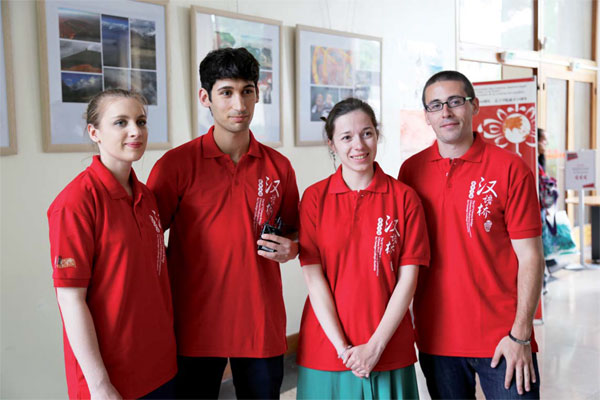Mandarin, money and the sheer joy of learning

| Contestants in the Chinese Bridge contest in France give many reasons for their interest in Chinese language and culture. Provided to China Daily |
| Chinese ambassador Zhai Jun gives speech after the competition. Provided to China Daily |
French college students put their Chinese skills to the test
She may come across as shy and reserved at first, but when Victoria Zanello, 23, was on stage recently for the Chinese proficiency competition in Montpellier, southern France, her confidence with the language and deep affection for Chinese literature was there for all to admire.
The student, originally from the northern city of Lille, was first in the preliminary round of Chinese Bridge in France, one of the largest and most well-known international competitions of Chinese proficiency for foreign college students.
She also became one of the three finalists representing France to compete with contestants from more than 70 countries in the final to be held in China this summer.
"I didn't expect it but I am really grateful for it (winning the top prize)," Zanello says.
Zanello, who is studying Chinese literature for a master's degree at Paul Valery University Montpellier III, says she developed an interest in the language when she was at primary school. Her favorite modern Chinese writer is Shen Congwen, and her undergraduate thesis was about him and his novels.
"There was no particular reason (for choosing Chinese) and no one in my family speaks the language," Zanello says. "I just fell in love with it naturally at a young age. The more I learn Chinese, the more appreciation I have for this ancient and beautiful language."
Zanello hopes she can continue to improve her Chinese and expects that she and her teammates will deliver an even better performance in the final competition in China.
Since China Bridge's inception in 2002, it has become an annual competition for the China to encourage the study of the language globally and an important platform for young non-Chinese to learn about the country and its culture.
In France this year, 33 contestants qualified for the preliminary round. They demonstrated their Chinese proficiency and skills thorough speeches and talent shows such as singing, reciting poetry, calligraphy, traditional Chinese dancing and crosstalk.
Some participants showed their strong passion for classical Chinese literature, and others showed their skills with Chinese pop culture and modern-day humor.
"The competition really offers them great encouragement in their efforts in learning the language," says Solange Cruveille, a Chinese professor at the university.
"The biggest change in the students is that they have become more open and positive about their future. They tend to complain about the economy and job market in France, but learning Chinese has made them much more optimistic."
As China's economic influence grows and trade and investment ties between it and France become closer, the number of young French people learning Chinese has grown greatly, and that in turn has increased the language's standing in France.
In 2013, more than 37,000 French students chose to study Chinese as a foreign language, compared with 9,000 just 10 years ago, the newspaper Le Parisien has reported.
Chinese has also become the fifth-most popular foreign language taught in French schools, after English, Spanish, German and Italian, and Mandarin classes are now offered in all French academic districts.
"I am paying close attention to China's development and I think it is a country with a lot of potential," says Elodie Le Gal, a student at University Paris X and a contestant in Chinese Bridge in France. "Being able to speak Chinese will help me find a good job, and I plan to pursue a career in China after I graduate."
The Confucius Institutes, which celebrate their 10th birthday this year, are also playing a key role in promoting China, its language and culture in France and elsewhere. There are 15 Confucius Institutes in France, the latest being in Montpellier.
"As a Spanish poet says, to have a new language is to have a new soul," said Zhai Jun, the Chinese ambassador to France, after the competition in Montpellier.
"Through learning the language, the French students can better understand the personality and the mindset of the Chinese people. These young students will be the most important ambassadors and the most solid bridges of the Chinese-Franco friendship."
While many students in France and elsewhere study Mandarin for economic reasons, some learn the language simply out of interest and pleasure.
"Interest is my best teacher," says Thibault Jourdain, a first-year college student who studies Chinese at the University of Artois in northern France. Even though he has been learning the language for only seven months, he can already perform crosstalk and make jokes in Chinese.
He became acquainted with China when he was 12, he says, when his mother handed him a copy of the Quotations of Chairman Mao Zedong. He wants to be a French teacher in China after he graduates, he says.
Hugo Mathe, a contestant from Aix-Marseille University, says he went to Henan province to learn martial arts when he was 20 and became interested in Chinese culture and language.
"I wasn't able to speak a word of Chinese but later I decided to learn it as I believe it will help me learn martial arts and Chinese culture.
"More importantly, learning Chinese brings me joy and happiness. It allows me to make new friends in China who I share similar views and value with. Being able to speak another language has broadened my mind and made me more positive about life."
lixiang@chinadaily.com.cn
(China Daily European Weekly 06/06/2014 page28)
Today's Top News
- Takaichi must stop rubbing salt in wounds, retract Taiwan remarks
- Millions vie for civil service jobs
- Chinese landmark trade corridor handles over 5m TEUs
- China holds first national civil service exam since raising eligibility age cap
- Xi's article on CPC self-reform to be published
- Xi stresses improving long-term mechanisms for cyberspace governance
































